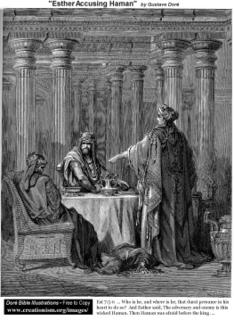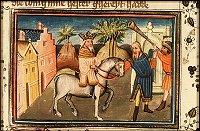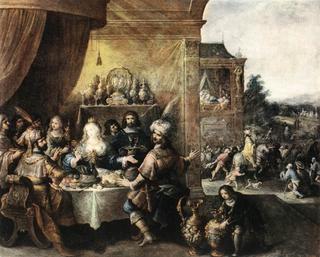Faith and Politics
On the prison island of Patmos, the Apostle John sat down one day to write words which still ring with power and joy:
“To him who loves us and has freed us from our sins by his blood, and has made us to be a kingdom and priests to serve his God and Father - to him be glory and power for ever and ever! Amen.”

These are not the words of a prisoner miserable he was imprisoned by the Romans with few prospects of personal improvement. John could see a glory shining long after the fall of the Roman empire. The conviction that as a believer his sins had been forgiven and he was a priest in a new kingdom gave him a dignity and mission that captivity could not destroy.
As believers in this Gospel, John is one of the giants on whose shoulders we perch. We are called into Christ’s kingdom and with it come the joys and responsibilities John knew and embraced. But we are in a dramatically different physical and social situation to the writer of Revelation.
Where he was in chains, we have freedom and prosperity unparalleled in human history. We can proclaim the amazing news about Jesus Christ and not fear persecution. Article 10 of the European Convention on Human Rights enshrines the right to be controversial.
The church has a tremendous track record of operating at its best when being persecuted. But instead of being locked up Christians are now offered the chance to run schools, charities are handed grants, and broadcasters are given licences.
If John arrived in Britain today we would probably understand what it means to have an “embarrassment of riches”. Just as filmmakers wonder what Rembrandt would have done with a movie camera or how Beethoven would have played an electric guitar, we can look around at the opportunities present in a liberal democracy and ask, “Where do we start?”

Rembrandt in one of many self-reflective moments
Behind this is the question which Christians ask daily, often with a furrowed brow: “Lord, what on earth is your will for my life?”
These cries are heard in heaven. Just believing that God is listening and will answer is a radical thing to do. It is a rebuke to both the humanist notion that God is unknowable and therefore we should live as if he didn’t exist, and the theological idea which has been stultifying the church for centuries that God is a passive being no longer energetically involved in shaping and loving his creation.
When we feel meaningless, powerless or downright confused, we should read again John’s declaration that Jesus “made us to be a kingdom and priests to serve his God and Father.”
Therefore, we have an identity and purpose which is more exciting and challenging and eternal than anything which can be written on a birth certificate or a passport. We belong to a community which would otherwise have nothing in common - not even a language - but who are ordered to somehow be united in love.
For some reason, it is God’s will that the people with whom he has made his home and given his Holy Spirit should live in this world in space and time. When all authority on earth and heaven was given to Jesus he didn’t decide to destroy the society which had just crucified him, instead he gave his human friends an incredible commission: “Go and make disciples of all nations, baptising them in the name of the Father and of the Son and of the Holy Spirit, and teaching them to obey everything I have commanded you. And surely I am with you always, to the end of the age.”

What has Jesus commanded us? In the Sermon on the Mount and in the stories of his life he shows us how to lead lives that will be a blessing even to our enemies. He subverts the priorities of greed and revenge of a pagan world not with violence but with love. In honouring God’s commitment to justice and peace we witness and worship his reality.
With such a brilliant role model as Jesus, it is clear that we should be doing something to be salt and light in society. The question remains: “What?”
Occasionally, the notion pops up of forming a Christian party and using the mechanisms of democratic power to become the Government. There are quite a few reasons why this is probably not a very good idea:
1. In a pretty secular culture, securing sufficient votes for an explicitly Christian manifesto would be almost impossible. The evangelical social activist Jim Wallis noted in 1976: “We must recognise that a true word from God will always be offensive and disrupting to those who have defined their lives autonomously. God’s revelation will never seem congenial to the presuppositions of secular society and culture.” Also, if mainstream parties knew Christians were voting en masse for a religious organisation they would have no incentive to listen to their views.
2. Believers’ ultimate loyalty is to the body of Christ, not the “national interest”. When trying to work out trade policy, would a Christian policy protect struggling farmers in Powys and slash their subsidies and bring a chance of prosperity to impoverished brothers and sisters in the developing world? If this seems like a tough decision, think how the electorate would respond to faith-inspired equivocating when “national security” is involved.
3. We have a very bad track record of trying to create utopias. Previous attempts have usually involved conquering the enemies we are supposed to be loving. When called before Pilate, Jesus said in John 18: “My kingdom is not of this world. if it were, my servants would fight to prevent my arrest by the Jews. But now my kingdom is from another place.”
Just as Peter was rebuked by Jesus for picking up a sword and attacking the men who came to arrest him, so it would be a mistake for Christians to start using the dark arts of spin and denigration of rivals for a false victory at the ballot box. It is God’s will to see a good society flourish; both Government and the church have exciting and distinct roles in making this happen.
One of the greatest challenges facing politicians today is how to stop society splintering into different groups which look at each other with suspicion and fear. Is it possible for people of different languages and religions to live together with anything other than distrust? Can racism and extremism be held back? Is there anything which can bind us together?
If the church should have one specialist subject area, it must be loving our neighbours. The story of the Good Samaritan shows how when this principle is put into action, ethnic and religious wounds can be healed.
So if we are to obey Christ’s teachings, we must be looking for ways to show his love to the poor and the disgraced. Political power can establish rights which protect different groups of people by putting fences around them. But politics cannot compel us to love those with whom we share a nation. The Holy Spirit, however, can.
Jesus told the story of the Good Samaritan during a conversation which began with a question from an expert in the law: “Teacher, what must I do to inherit eternal life?” A church that tries to love God without loving one’s neighbour will be like a one-winged bird: lying on the ground, wondering why it can’t fly while slowly dying.
True evangelism, where we welcome the stranger into a new kingdom where he or she will become our brother or sister and a child of God, can only have a transforming effect on society. In Northern Ireland it is when Christians have shed the nominal labels of Catholic or Protestant that the most astounding reconciliation has taken place. At the most simple level, the growth of the kingdom can only be a good thing. Teachers and social workers cite the lack of self-esteem and the absence of role models as one of the causes of the suicide, addiction and delinquency which threaten so many children. Christ’s resurrection has made it possible for us to invite people into the world’s biggest family.
Contemplating the wonders of this reality - studying scripture and joining in prayer and praise - is one of the best things that somebody who wants to change the world could do.
The theologian Stanley Hauerwas writes: “We do not learn about the demands of the kingdom by learning about freedom and equality; rather, we must first experience the kingdom if even we are to know what kind of freedom and what kind of equality we should desire.”
Politicians rightly work to promote a nation’s prosperity, but while the pursuit of happiness is a much better goal than the pursuit of, say, nationalism, it is important that we testify that the quality of a society is not solely determined by the bank balances of its citizens. A community where a Rolex is considered of greater value than social justice will soon start to rot. In the priorities by which we live our lives, we can demonstrate the new ways of living that the resurrection has made possible.
Jim Wallis wrote: “Because the ultimate triumph of the kingdom is sure, we are freed not to live according to the world’s standards but to participate boldly in its coming. The church is called to be the first fruits of the kingdom, a body of people who can begin to taste what God wills for human life and society.”
William Wilberforce was born in the 18th century when supposedly “decent” people considered it perfectly respectable to kidnap and sell Africans. Wilberforce, however, was a member of a small congregation of people who placed the highest importance on meeting together, praying, studying scripture, and seeking God’s will. When Wilberforce looked at the character of God and teaching of Jesus, when he saw the incredible dignity inherent in every created human being, he recognised the slave trade for the abomination it was and dedicated his life to ending it. It was on his death bed he learned of its abolition. His friends played pivotal roles in ending the exploitation of children. The paradox is that the more intimate our relationship with God is, the greater will be the blessing we can bring to the world.
Many Christians believe that just as the slaves of Wilberforce’s time were not considered full human beings because doing so would be an economic inconvenience to society, so the sacredness of the unborn has been forgotten. In the 19th century, more than 1m people in Ireland starved to death after the potato harvest failed; a simple change in Government policy could have changed the course of history on that island, but preserving the economic doctrine of non-intervention in the economy seemed of more value than human life.
Dietrich Bonhoeffer, one of the most famous martyrs of the Second World War, was among a group of Christians alarmed at how a spiritually shallow church had lacked the conviction to oppose Nazism, even as its stench rose into the highest office in Germany. He did not believe in violent revolution, but he believed a people who had the privilege of glimpsing revelation had a responsibility to identify and fight the spread of sin.
He wrote: “It is part of the church’s office of guardianship that she shall call sin by its name and that she shall warn men against sin... If the Church did not do this, she would be incurring part of the guilt for the blood of the wicked.”
Bonhoeffer was challenged by reading the third chapter of Ezekiel - verses 17-18:
“Son of man, I have made you a watchman for the house of Israel; so hear the word I speak and give them warning from me. When I say to a wicked man, ‘You will surely die, and you do not warn him or speak out to dissuade him from his evil ways in order to save his life, that wicked man will die for his sin, and I will hold you accountable for his blood.’”
Ezekiel did not live in a democracy. We do. Not only to have the freedom to take part in public debate and to vote, but the system depends on our involvement for it to function. A democracy is only as good as the commitment of its citizens. If we have the opportunity to vote - or even stand for office when we believe we can make a real contribution for the good of everyone - we have a responsibility.
Poverty in the developing world is matched by a poverty of imagination, vision and moral leadership among the rich nations. A series of signatures on a sheet of paper could end the scandal of people dying from dirty water and mosquito bites in the 21st century. We are at a point in history where we have the financial power to change the world. This power may ebb away, which is why it is so important we seize the challenges of this era of opportunity.
Never think that a letter to an MP goes straight into the bin. People who have been voted into jobs are acutely interested in what voters think. Nothing is as prized in politics as the discovery of a good idea.
Confusion and uncertainty define public debate on so many public issues. How should society deal with subjects such as human cloning or gay rights? The Bible may not offer ready-made solutions for our dilemma-ridden times, but it has a wealth of principles and brilliant ideas. As a church we need to delve into scripture. If we do not ask ‘What does the Bible teach?,’ who will? If we hear the prophetic voice of the Holy Spirit and remain silent, how will God judge our generation?
And in communicating truth, it’s essential we heed Jesus’ attitude to the “sinners” of his day. Our question should not be, “How can we demonise those who would silence us?” but “Who are our enemies and how can we love them?”
Incredible damage has been done by people claiming to be doing God’s will. It was the dream of Popes and Cromwell to recapture Jerusalem. A study of the New Testament would have shown that anyone claiming the use of violence can be used to promote the kingdom of God is on incredibly shaky ground. When we want to know what God’s will is, we should put some faith in the power and possibility of prayer and ask him. God’s word helps us identify evil, and Christ’s life shows us how we should confront it.
A theologian with the marvelous name of William Stringfellow wrote in his book Suspect Tenderness: “Tactics cannot be severed from ethics, and imitation of the enemy is the most common way in which ideology has been confounded, idealism corrupted, and revolutions rendered futile.”
Yes, a lot can go wrong when Christians get involved in the world outside the church doors. But just as it would be bad news for patients if fear of litigation stopped surgeons from entering the operating theatre, we have a duty to care for the world God created and loves so much at such cost.
The books of the so-called Minor Prophets glow with God’s rage at poverty and injustice. If God is so concerned for the widow and the orphan and the alien, we should seek his wisdom when we try to bring them hope and help. If we know that politicians are turning their hair white trying to solve “crises” in healthcare, pensions and housing, let’s ask God for guidance in these everyday issues.
Christmas is the story of God becoming a man, making himself vulnerable and sharing in the chaos of this world. He is interested in the minute aspects of the human life.
As Jesus says in Matthew 7: “Which of you, if his son asks for bread will give him a stone? Or if he asks for a fish, will give him a snake? If you, though you are evil, know how to give good gifts to your children, how much more will your Father in heaven give good gifts to those who ask him?”
So if society seems in urgent need of a just policy for immigration, biotechnology, trade or social services, let us ask that the Father of justice will reveal one to the men and women who have been elected to Government.
Paul told Timothy: “I urge, then, first of all that requests, prayers, intercession and thanksgiving be made for everyone - for kings and all those in authority, that we live peaceful and quiet lives in all godliness and holiness.” (1 Tim 2:1-2)
The call to serve in Government is a noble one. While some might conclude that it is a “necessary evil” for a nation to sometimes have to go to war to prevent the march of evil, we were given a mandate to tend creation before the Fall.
In Genesis 1 God says: “Let us make man in our image, in our likeness, and let him rule over the fish of the sea and the birds of the air, over the livestock, over all the earth, and over all the creatures that move along the ground.”
The preservation of freedom, the restraint and punishment of evil and care for the vulnerable are pursuits God can bless.
Rather than pray for the downfall of their ruler, Paul wrote to the Christians in Rome: “He is God’s servant, an agent of wrath to bring punishment to the wrongdoer. Therefore, it is necessary to submit to the authorities, not only because of possible punishment but also because of conscience.”
Even Bonhoeffer did not lose his faith in the potential for Government to work in a way pleasing to God.
He wrote: “Whether or not Government is aware of its own true basis, its task consists in maintaining by the power of the sword an outward justice in which life is preserved and thus held open for Christ.”
This year, great decisions about the preservation of life are being taken. Questions are being asked about when life can be made in a petri dish and when it can be ended in a hospital bed. If we don’t pray for policymakers and contribute to the debate where we can, how can we complain about the outcome?
There are great Christians in all the main parties in Britain. The fact they can hold wildly differing views is to be celebrated. It is good when the two great steeds of judgment and mercy are pulling us in different directions. In a creation as rich and varied as the one God has given us it is unthinkable that one political party could hold the solution to every problem. The strategy for Christendom in the 21st century should not be a forceful domination of the public square but a saturation of grace.
What would a great Conservative party look like? What type of policies would a godly Labour party promote? How would the Liberal Democrats act if they were filled with people who prayed for wisdom?
It would be a splendid thing if Christians joined such parties so as to contribute to that wonderful concept, the common good. Party membership is plummeting across the Western world, contributions of ideas are desperately needed, and the opportunities for influence and service have probably never been greater. It is just as important that believers are in such organisations to ask the right questions as to try and give the right answers.
Our ultimate home as Christians is in another kingdom whose revelation all creation awaits. While this age continues, let us welcome new people into the body of Christ with urgency and joy. May we be the people that a state is blessed to count among its population, witnessing to a greater hope than a human mind can conceive.
One of the many comforting aspects of the Bible is that for every example of a human being doing something right, there are several where things go spectacularly wrong. With almost grinding repetition, kings do “evil in the sight of the Lord.” Men and women seem to have the best relationship with God not when they are convinced they are ruling with his authority, but when they are in a state of exile, like Daniel, the Babylonian trio who refused to bow before the statue, and Esther and Mordecai. Great things happen when we serve as stewards, waiting for our great God to work and then following his lead.























